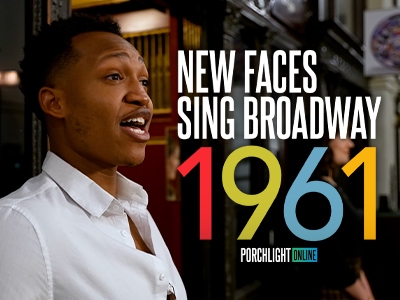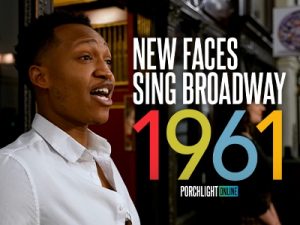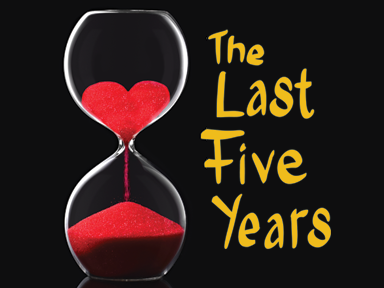
 Recommended *** “New Faces Sing Broadway 1961”, directed by Brianna Borger, is derived from an old Broadway tradition that dates from the years 1934 through 1968 of compiling songs from new musical works produced in a given year. Hosted by Kelvin Roston, Jr. and produced by Porchlight Music Theatre, this highly enjoyable show features songs taken from award-winning musicals as well as flops from 1961 and showcases new faces in musicals sixty years later, such as Lexie Bailey, Nicole Barth, Marcus Canada, Chloe Howard, Izzie Jones, Clare Kennedy, Maurice Rex Randle, Abraham Shaw, and Tommy Thurston. Roston also sings several numbers in addition to his fast and furious narrative of the year’s musical highlights. Tom Vendafreddo accompanies all of them devotedly on piano and also serves as music director, arranger, and vocalist. Filmed in the historic Studebaker Theatre, on Chicago’s Michigan Avenue, CastleLight Productions has done an excellent job with the camerawork and in turning raw footage into a successful recorded video stream.
Recommended *** “New Faces Sing Broadway 1961”, directed by Brianna Borger, is derived from an old Broadway tradition that dates from the years 1934 through 1968 of compiling songs from new musical works produced in a given year. Hosted by Kelvin Roston, Jr. and produced by Porchlight Music Theatre, this highly enjoyable show features songs taken from award-winning musicals as well as flops from 1961 and showcases new faces in musicals sixty years later, such as Lexie Bailey, Nicole Barth, Marcus Canada, Chloe Howard, Izzie Jones, Clare Kennedy, Maurice Rex Randle, Abraham Shaw, and Tommy Thurston. Roston also sings several numbers in addition to his fast and furious narrative of the year’s musical highlights. Tom Vendafreddo accompanies all of them devotedly on piano and also serves as music director, arranger, and vocalist. Filmed in the historic Studebaker Theatre, on Chicago’s Michigan Avenue, CastleLight Productions has done an excellent job with the camerawork and in turning raw footage into a successful recorded video stream.
This is a rather heady retrospective of the year 1961 in song that successfully brings back the flavor of the era. The show takes us to a very different America: a time period after the Korean War and before Vietnam, where the nation faced the realities of the Cold War and the threat of nuclear attack. Concerns over love and life in the office made “How to Succeed in Business without Really Trying” the top hit of 1961-62, with 1,417 performances, and belies an era of relative affluence in U.S. history (at least for the white middle class) by personalizing the rather impersonal corporate culture that sprang up during the 1950s. When John F. Kennedy became President in 1961, his Administration was thought to usher in a time of hope and promise, where bold initiatives to reform society in the area of civil rights and equal housing and education seemed achievable. However, after his assassination in 1963, the brief period of his Presidency was later nicknamed Camelot, after the 1961 Tony Award-winning musical.
Inasmuch as “New Faces Sing Broadway 1961” is replete with substantial entertainment and educational value, the production is not without its problems. The biggest and most obvious is that of the sound mix. The balance between the piano accompaniment and the vocals is largely weighed too heavily in favor of the piano, whose sound is generally too crisp and loud. This interferes with our ability to fully appreciate each of the vocalists’ fine talents and makes us hesitate for a moment when we try to grasp the lyrics. The second problem is the unnecessary inclusion of mini-autobiographies before some of the numbers. Presumably the thought behind this was to humanize the talent. But having the audience learn in advance whether a performer is gender-conforming or nonconforming is superfluous to their artistry. This background material should have no bearing on how to evaluate the quality of any one performer; if we happen to take a personal interest in this information, it should best be left for the written program. In addition, hearing each of the stars relate some brief (and usually strange) “fun fact” about their life was neither here nor there. It’s not appropriate for performing artists to have to put themselves down in public prior to taking the stage. Deleting these profiles—with their relatively poor sound quality—would make the entire presentation flow better and would cut down the overall time of the show, which currently stands at 75 minutes.
The final issue has to do with Chicago’s sense of local history in relationship to Broadway. During an interlude/intermission, Porchlight’s artistic director Michael Weber asks the audience some trivia questions about theatre and then turns his attention to the history of Chicago theatre buildings while we are presumably thinking up the answers. While the historical documentation was interesting (and brought back memories of my own childhood), the narrative needed to be better integrated with the theme of 1961. Perhaps mentioning something about what was playing at the various Chicago theatres at the time might have filled in the gap, considering that a number of theatres mentioned in this segment apparently had little or no connection to that year at all.
In brief, “New Faces Sing Broadway 1961” is a wonderful fusion of music, biography, history, and performance that instills within us a sense of an era gone by. The extensively researched scripted narrative is just as much about social history as it is about the composers who wrote the songs and the stars who sang them back then and now. Seeing both the new faces of today and learning the story of those who once graced the stage melds history with modernity. What makes this video production especially worthwhile is listening to Chicago’s remarkable singing talent. And whether we are talking about 1961 or 2021, the featured compositions are still appealing and timeless.
“New Faces Sing Broadway 1961” is available for online streaming through Sunday, May 16, 2021.
Tickets are $25-$50 and are on sale now through the Porchlight Music Theatre website: https://porchlightmusictheatre.org/ or call the Porchlight Music Theatre box office at 773-777-9884.
To see what others are saying, visit www.theatreinchicago.com, go to Review Round-Up and click at “New Faces Sing Broadway 1961”.






More Stories
“The Last Five Years” MILWAUKEE
“The Trial of Themistocles” reviewed by Julia W. Rath
“Titanique”